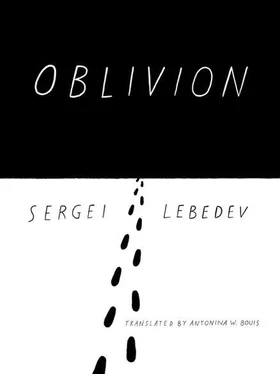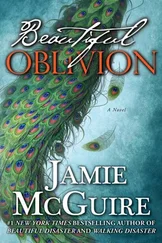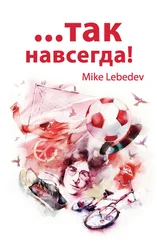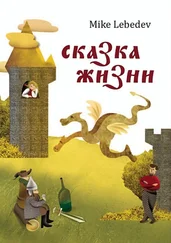One garden was tended: strangely, it was entirely planted with potatoes, leaving only a narrow walk to the house, every bed filled with potatoes, as if nothing else grew anywhere in the village. Someone was inside the house, smoke came out of the crumbling chimney that dropped pieces of brick onto the mossy roof, but the windows were shuttered tight.
Behind the house there was a creaking, grinding noise, metal on stone, ringing and then grinding again; the blue twilight that made the air thicken as it grew colder without losing its transparency settled on the village, and each screech caused goose bumps, warning me not to come closer—only forged steel could sound like that. Three apple trees by the house—how much effort had it taken to grow them here!— had gone wild, all their force going into offshoots and foliage, and the branches untouched by buds dropped brown leaves onto the ground; the color of dead leaves, the color of rotting apples was everywhere, giving the house and ground an aging, debilitated air. Old pruning cuts painted with pitch remained on the trees, but the pitch had cracked and fallen off, and even though the tree had grown a tight leathery circle around the cuts, the trunks were already crumbling and the roots were probably dying off. The wires holding branches that threatened to fall off dug too hard into the wood, cutting the bark.
I went into that small fallow garden, engulfed in the bitter-ash smoke that comes from a badly built or deteriorating stove; it was getting colder and the leaves fell less frequently, as if their twigs were growing torpid.
Behind the house, at a grinding machine made from a converted foot-operated sewing machine, sat a shaggy old man; I saw him from the back, broad and hunched, half covered by long, tangled, gray hair, with apple leaves nestled in them; I thought at first that he was a werewolf with claws, but then I realized they were fingernails, yellow, curved, broken or crookedly cut. The old man was sharpening an axe on a long handle, a lumberjack’s axe; it was badly chipped, someone had used it to chop up boards of an old structure and kept hitting nails; long streams of reddish sparks caused by the uneven blade edge on the whetstone flew in the air, illuminating nothing but merely sewing through the dark; the wheels turned and the dry belts creaked.
The old man, the sharpening wheel—rougher than needed for fine sharpening—and the axe; I went farther along, not ready to call out to the man, when I saw a second one. He was on the porch steps, bent over a fishing net on his knees, and the same kind of thick, unkempt hair covered his face. The old man was mending the net, unwinding rough thread from a spool the size of his hand, making loops with a curved faceted needle and muttering to himself—his beard stirred as if a mouse had moved into it. A third old man, also on the porch, just as gray and shaggy, was carving a boat frame; the wooden piece had a bend with an inconvenient elbow, and the old man clumsily moved his long knife along it.
I greeted them. The three old men turned to me, dropping their work. I still couldn’t make out their faces: their hair fell over their eyes. Their fingernails belonged to animals or birds, and their hair grew so thickly it could have been moss or weeds.
The old men were silent and uncomprehending. Telling them apart by their clothing was difficult: their padded jackets and trousers had not been washed in so long they had taken on the same indefinite color of grime, and new spots vanished among the old; the one with the axe had a scar across his palm, the one mending the net had a thimble that had become ingrown on a finger of his left hand and in the finger of the right, a fishhook that had jabbed his calloused skin, yellow as candle stearin, was hanging as if from the lip of an old fish; and the one who had been whittling wore a darkened ring.
“The dogs got themselves lost,” said the fisherman.
The man spoke as if they were still just three; as if they had always lived the three of them and a fourth never was and never could be, and thus I did not fit into his field of comprehension and he might not figure out for several days that there was a stranger among them. Their solitude together was older than they were, time had vanished within it, and the old men had aged not only with the years but because the days of their lives resembled one another, and the days did not bring new impressions but merely subtracted old ones from their memory.
“The dogs got themselves lost,” the fisherman repeated, and the other two replied, “Lost.”
Their voices were like old things being used after a long hiatus; the sounds did not fit together properly, hanging on by hook or crook, dangling like a loose button. They sounded like dead men who had acquired new flesh but could not adjust the new voice to the old words.
The man with the axe leaned against his sharpener, the fishermen stuck the needle in his jacket, and the whittler put the knife away inside his boot. Wind came from the higher reaches of the river, the wind moved the old men’s hair, pushing it from their eyes.
The men were blind; their minds were damaged and their gazes were stopped like a run-down clock. The lens, cornea, iris, the entire eye was whole, the visual core of the brain was whole, but the mind refused to allow the visible world in, refused to see. The eyes were those of a sleeping man whose lids were lifted without rousing him, and the pupils were like binoculars turned inward, into the head, the dark cosmos of dreams that is not accessible to the waking.
I waited, not knowing what time of day was in their heads, if they had any time at all, at what point they lost their sight, if they remembered the house, the apple trees, the village, the river, the land on both sides, if they understood where I was and who they were.
They were brothers, and no longer able to see, they came to resemble one another even more. Their faces fell into neglect; the unconsciousness that annihilated their lives also annihilated their distinguishing features. All that was left in their faces was what had been placed there by their parents’ blood: their faces had been taken over by their fathers, grandfathers, and great-grandfathers, and it seemed those figures would start coming out, opening the flesh like a door, and exiting one at a time, and once the last one was out, gaping emptiness would replace the face.
The old men finally understood that a stranger had come to the village; they surrounded me and ran their hands over my face and body; I stood and thought that I had truly reached the limit of memory; the blindness of the exiled old men, the blindness of Grandfather II all combined; this place did not exist in geography, an accidental traveler would not find this village, he would miss it; this was a country inhabited by people from the days of Grandfather II, an entire country that had protected itself from the present through blindness and then became trapped in it. While the old men molded my appearance for themselves with their hands, I thought about how not to linger here and destroy the insularity of this world.
Essentially, the old men had one memory for the three of them; separate them, and each one’s memory would not be enough for a complete description of the events, so they often spoke simultaneously, creating a collected field of memory that lived only in words. I asked about the apple trees, impossible to imagine here near the Arctic Circle, planted in permafrost that would not allow roots to penetrate, and they told me that the whole village stood on soil that was brought in, stolen— the exiles were not allowed to leave their place of exile.
For a dozen years the people secretly took boats to the upper reaches, where there were forests and soil, they chopped down trees, made rafts to float them down to build huts and sent soil on the rafts as well; it took ten years before the first garden bed appeared in the village—before that, the exiles had lived on imported food products and by hunting. The authorities had set up a cordon on the river to overturn the rafts—they allowed them to cut down trees but not to take away soil; the reindeer herders even wondered if the exiles ate the soil, they were bringing so much, and they couldn’t understand what for, since for nomads soil could not give birth to anything but reindeer moss. The villagers might have given up on the idea but most of them were kulak peasants and they put their entire organizing force, their passion for life into a calculated gathering of soil, real soil, without pity for themselves or others; they called the local soil mud, which it was, a runny liquid of mud on ice.
Читать дальше












